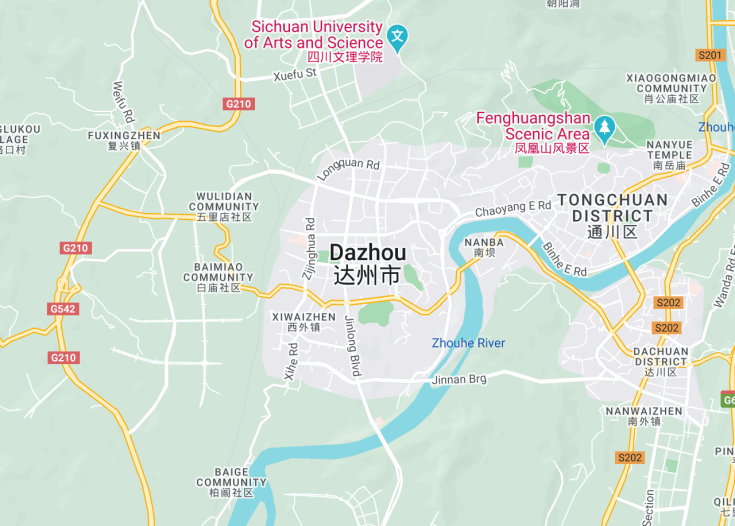Nestled in the heart of China’s Sichuan Province, Dazhou is a captivating city known for its rich history and vibrant cultural heritage. This city serves as a fascinating gateway to explore the intricacies of ancient Chinese civilization and its modern day transitions. Dazhou boasts scenic landscapes, traditional architectures, and an engaging array of cultural festivals that highlight its historical significance and the warmth of its people. Ideal for travelers keen on immersing themselves in deep cultural experiences, Dazhou offers a unique blend of tranquility and historical exploration.
Before visiting Dazhou, ensure to check the local calendar to participate in traditional festivals, providing deep insights into the local culture and customs.
For a true taste of Dazhou, try local cuisines like Sichuan hotpot and Dazhou spicy chicken, which are sure to delight your palate with authentic flavors.
Top things to do & see in Dazhou
Select the following sights and activities to discover best tickets and tours available in Dazhou.
Dazhou: The Gateway to Eastern Sichuan
| Country | China |
| Time in Dazhou | GMT+8 |
| Language spoken | Mandarin Chinese |
| Population | 5.4 million (China Statistical Yearbook 2022) |
| Currency | Renminbi (¥, CNY) |
| Airports |
|
Dazhou, located in the northeastern part of Sichuan province, is a city rich in history and culture. With a current urban population of approximately 5.4 million, it serves as an important regional hub for commerce and transportation in eastern Sichuan. Known for its picturesque landscapes and historical sites, Dazhou boasts attractions such as the ancient city walls and the Dazhu County’s many decades-old architectural marvels. In addition to its historical significance, Dazhou is an economic center with industries ranging from machinery and electronics to food processing and pharmaceuticals.
The city’s cultural tapestry is vibrant, with traditional opera and folk dances providing insight into the rich heritage of the area. Dazhou is also notable for its lush, verdant hills and clear waters which are prominent in local poetry and art. Furthermore, Dazhou acts as a vital link between the Capitaleconomic zone and western China, enhancing its strategic importance. The city’s well-developed transportation infrastructure, including the Dazhou Heshi Airport, supports its role as a key logistics and trade gateway, facilitating ongoing development and connectivity in the region.
Where is Dazhou?
Nestled in the northeastern part of Sichuan Province, Dazhou is bordered by mountains and rivers, offering scenic views and a strategic location.
Distances:
| Route | Distance by car | Time by car |
|---|---|---|
| Chengdu to Dazhou | 222 miles (358 km) | Approx. 4 hours |
| Chongqing to Dazhou | 261 miles (420 km) | Approx. 5 hours |
What is Dazhou famous for?
Rich in history and culture, Dazhou is famed for its historic battles and as a stronghold during various dynasties. Today, it is known for its flourishing industries and beautiful, expansive landscapes.
History
Ancient Foundations: Prehistory to 221 BC
The region of Dazhou has been inhabited since prehistoric times, with archaeological evidence suggesting the presence of human settlements as far back as the Neolithic period. It was during the Eastern Zhou Dynasty that the area began to gain significance, due to its strategic location along the major river systems which were vital trade and transportation routes.
The Imperial Era: 221 BC – 1912 AD
With the unification of China under the Qin Dynasty, Dazhou found itself firmly within the sphere of imperial influence. The Sui and Tang dynasties, in particular, saw a blossoming of the region as it became a critical defensive outpost against northern invaders. During the Ming and Qing dynasties, Dazhou further developed culturally and economically, serving as an important center of trade and commerce.
The Modern Period: 1912 – Present day
The fall of the Qing Dynasty brought about dramatic changes in Dazhou as the Republic of China took control. In the later 20th and early 21st centuries, Dazhou has continued to grow, adapting to the shifts in China’s economic policies and increasingly positioning itself as a key player in the regional economy. Recent years have seen a focus on technological development and infrastructure improvement, propelling Dazhou into a new era of prosperity and connectivity.
Visit Dazhou
What to see and do in Dazhou, China
Visitors to Dazhou will find a blend of historical and contemporary attractions. Key sites include the Dazhou Museum, where artifacts and exhibitions narrate the city’s rich history. Nature enthusiasts will enjoy trips to the scenic Daduhe River and Qianye Lake, perfect for boat rides and picturesque walks. For a taste of local life, explore the vibrant marketplace in the city center where traditional crafts and foods can be appreciated.
- Dazhou Museum
- Daduhe River
- Qianye Lake
- City Center Marketplace
Celebrations in Dazhou
Dazhou hosts several annual events that reflect its cultural heritage. Notably, the Dazhou Dragon Boat Festival, held in June, is a vibrant and colorful spectacle, drawing crowds from across the region. The Autumn Harvest Festival in September celebrates local agriculture with festivities that include traditional music and dance performances.
Best time to visit Dazhou
The ideal time to visit Dazhou is during the spring (March to May) and autumn (September to November). These seasons offer pleasant weather, conducive to exploring the great outdoors and attending the numerous cultural festivals the city has to offer.
Is Dazhou worth visiting?
Dazhou, with its blend of historical allure and modern dynamics, offers a unique glimpse into the heritage and evolution of a lesser-known Chinese city. Attractions such as its museums, picturesque landscapes, and vibrant local culture present compelling reasons to visit. However, travelers seeking more mainstream tourist experiences might find it less appealing compared to other destinations with more renowned attractions.
Accessibility might also pose a challenge due to its relatively remote location. Nevertheless, for those intrigued by authentic cultural experiences and off-the-beaten-path adventures, Dazhou is undoubtedly worth considering.









